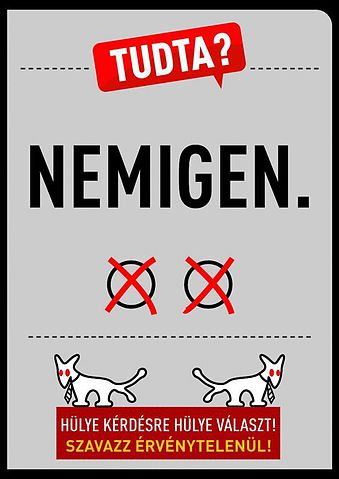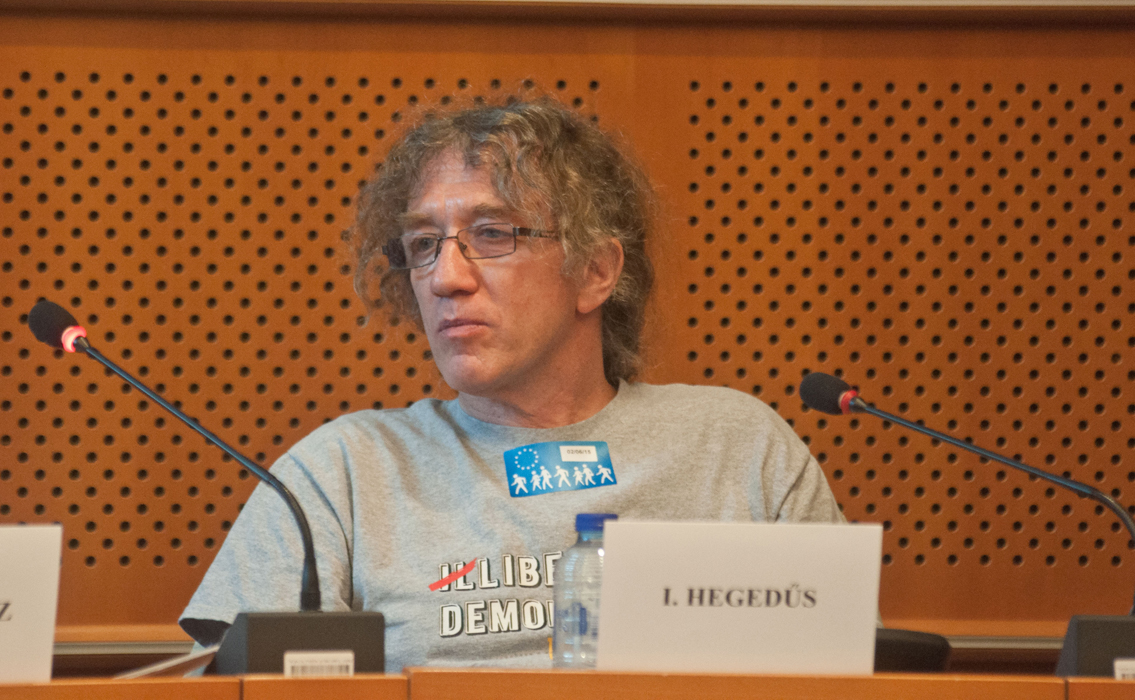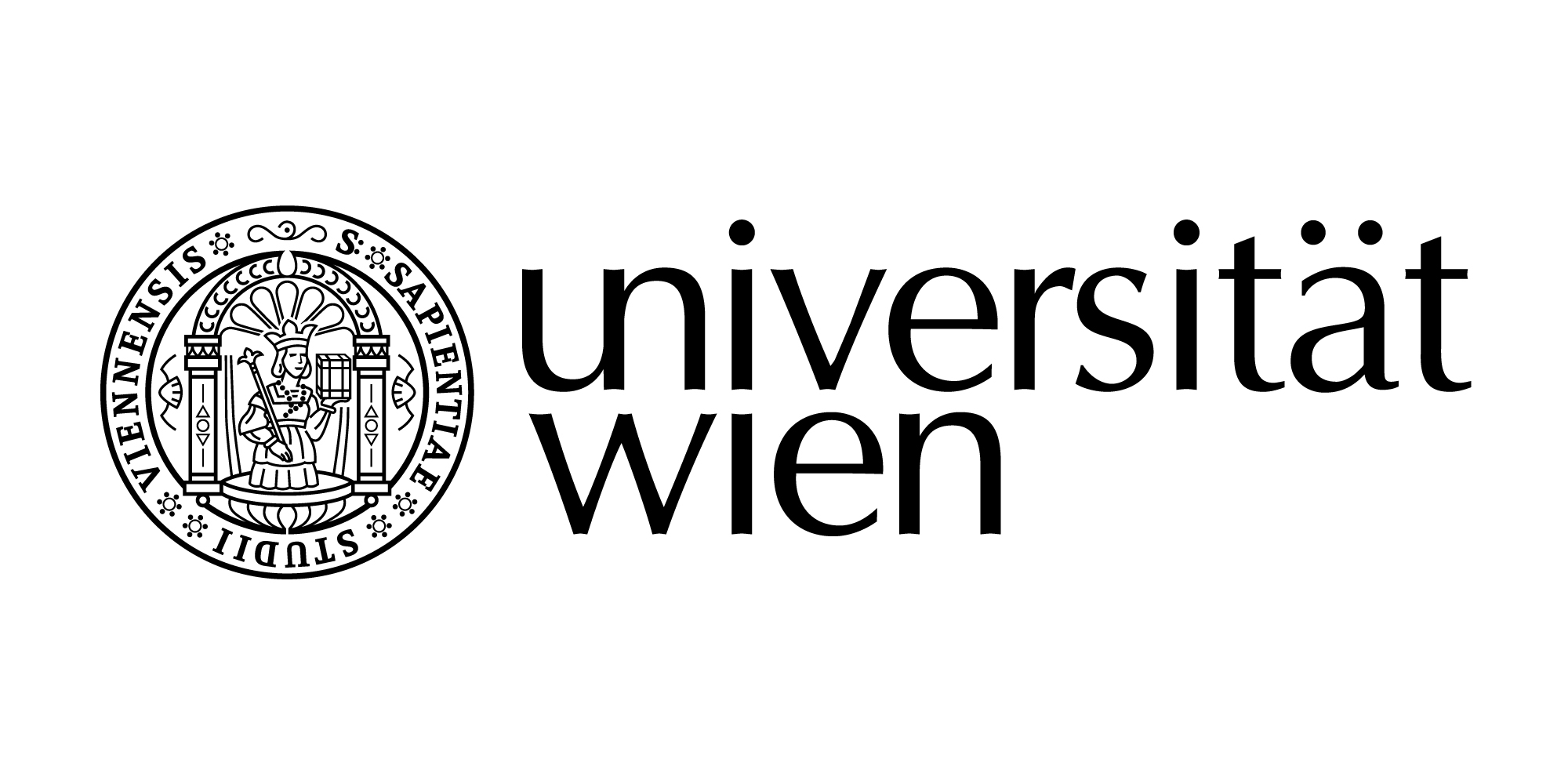
Orbán’s Victory or the Endgame of His Regime?
Let’s start with the political communication strategy of the Hungarian government. Citizens were supposed to answer the question of the national referendum, better to say, to react to a charge that a “compulsory resettlement” of non-Hungarian citizens, allegedly forced on Hungary by the European Union, would take place in the future. On the evening of 2nd October 2016, Prime Minister Viktor Orbán proclaimed a victory. He said that more than 3.2 million people voted in favour of his party’s “no” position: this outcome created a “new unity”, a significantly bigger political force than the scale of the electorate of Fidesz had been two years before. Moreover, this time the amount of the “no” votes slightly exceeded the number of the “yes” votes in the referendum about the accession to the European Union held in 2003. 98 percent of the valid ballots followed the recommendation of his ruling party, Fidesz. So, the success of the referendum is unquestionable: the will of the people should be immediately translated into political action. That is why the Hungarian Parliament will incorporate the decision of the nation into the Hungarian Basic Law – which replaced the old “communist” constitution in 2011.
Domestically and internationally, nobody seemed to accept Orbán’s rhetorical tricks about the government’s triumph – except, probably, the hard core of his followers. First of all, if we include the supporters of Jobbik – and we should do so, since the radical right-wing party also mobilised for a “no” vote -, the 3.2 million supporters actually equal the voters of the two party camps altogether back in 2014 at the last national elections. Secondly, the result of an almost hundred percent support in favour of the government reminded many observers of the good old Communist times and made the whole enterprise even suspicious. But the most striking and self-unmasking part of Orbán’s argumentation was the lack of any mentioning of the most important simple fact: the referendum failed since it was invalid. It was not valid because of the low turnout and a surprisingly high number of invalid votes. Orbán forgot to mention that most opposition parties had called for a boycott, whilst twenty-some Hungarian NGO-s, including the Hungarian Europe Society, had asked citizens to invalidate the “pointless” and “inhuman” referendum. The civil groups explained that the “question does not entail any specific legal consequences, nor does it make clear exactly what entitlement the government asks for from citizens, as this has never been revealed”[i]. Actually, it was a fun group called the Two-Tailed Dog Party, which reached quite a high coverage in the non-pro-governmental traditional and social media. The small group successfully used the method of crowd-sourcing on the Internet and collected significant financial contributions. Its satirical messages undermined the government’s efforts “in both style and content. There are 27 versions, which include: Did you know there’s a war in Syria? Did you know a tree might fall on your head? Did you know that in the 16th Century in Somogy county, 42 people were attacked by bears? Did you know one million Hungarians want to emigrate to Europe?[ii]”

“Stupid question stupid answer!” – “Vote invalidly”. One of the Hungarian Two-Tailed Dog Party’s referendum posters of 2016. Nemigen can be translated as “not really”, but also is a combination of the words no (nem) and yes (igen).
This was a tiny counter-offensive compared to the enormous official propaganda machinery of the government which started to spread anti-migrant propaganda called “public interest information” already during the summer – long before the start of the short campaign period permitted by law. By the end of September, according to the watchdog Átlátszó, the communication expenditures have overrun the expenses spent by the Leave and the Remain camps altogether during the Brexit campaign[iii]. Just to mention one element: during the Olympic Games which were broadcast by the completely government controlled public TV, advertisements appeared on the screen bombarding the viewers with questions like “Did you know that the Paris terrorist attacks were committed by migrants?”[iv]. It is hard to tell whether Orbán’s spin doctors had gone too far making sport enthusiasts rather nervous who wanted to concentrate on the competition of the athletes. In this climate it seemed to be a conscious decision when a reporter skipped the introduction of the famous Syrian refugee swimmer, Yusra Mardini[v], although she even won her qualification round[vi]. In general, the propagandistic and bias reporting of the public TV, ironically called “royal’ TV, on the issue of the referendum has been well documented[vii].
Moving one step back: the idea of holding a referendum was well-prepared in a toxic political climate during the last two years. Viktor Orbán started to blame economic migration right after the Charlie Hebdo murders in Paris in January 2015. The government conducted a xenophobic bill-board campaign and a “national consultation” on migration and terrorism long before the peak of the refugee influx into Hungary as a transit-country during the summer of 2015. An internationally criticised fence was built at the Serbian-Hungarian border by September 2015 when the Hungarian refugee policy was also strictly criminalising people in flight, whilst human rights organisations, the American-Hungarian philanthrop George Soros, the Brussels “bureaucrats”, the “leftist” mainstream European politicians and even Angela Merkel’s German government have been constantly and sharply attacked in the Hungarian pro-governmental media.[viii] Increasing public security was the most characteristic element of the government’s approach as a successful method how to create a dominant narrative of the events.
Moving two steps back: the refugee crisis has given an ideal opportunity for Viktor Orbán’s “illiberal democracy”, which had already been under construction since 2010, to name and blame new and unprotected enemies. The Hungarian government was once again strongly criticised by a resolution of the European Parliament in 2015, but top European political actors lacked the legal competences and, perhaps, the political will to take a tougher, critical line – just like in the previous years[ix]. Later on, as the political climate has shifted from “Willkommenskultur” to the concept of “defending” Europe’s borders in many member states, the extreme Hungarian case partially lost its relevance. Moreover, Orbán declared a “cultural counter-revolution” together with Jarosław Kaczyński, the leader of the Polish ruling party[x] – and the European Union had no reply to the challenge.
Coming back to the Hungarian referendum: the most significant result of this peculiar story is the fact that the government was unable to mobilise (and “fideszise”) the bigger part of the society – in spite of an unprecedented massive xenophobic and nationalistic campaign. This is definitely good news for the supporters of liberal democracy and a big “slap in the face” of Orbán, as Alexander Graf Lambsdorff, a liberal Member of the European Parliament claimed the day after the referendum[xi]. On the other hand, the fifty percent validity threshold – actually introduced by the Fidesz-government itself – proved to be quite a hard criterion and, perhaps, it is simply too high. But a more important issue at the moment is the real attitudes of those who abstained. It would be good to know whatever reasons people had when they decided to stay at home. How many citizens wanted to boycott Orbán’s call in accordance with the arguments of the democratic opposition, or, did they feel a general apathy towards politics and an antipathy to all competing political elites? From this perspective, the opposition parties probably cannot declare a victory, either.
The outcome of the referendum was great news for the European political leaders who have criticised Orbán’s populism and his illiberal political measures. The risk of spreading populist referendum initiatives about migration inside the European Union, and especially in Central Europe among the Visegrád countries, has decreased. Also, Orbán has suffered heavy image damage as a strong political leader and constant winner at home, and, recently, at the European level. Instead, liberal-minded EU members and mainstream political parties might keep the Hungarian Prime Minister in a relative isolation. Right after the referendum, the most influential world papers portrayed Orbán as a dangerous political entrepreneur who should be stopped by the European elites[xii].
Meanwhile in Hungary, Orbán seems to be looking for old and new scape-goats: the closure of Népszabadság, the biggest opposition print newspaper and its website[xiii] fits into an assumption about his desperate intention for revenge and punishment. Once again, a target group in danger might be the circle of liberal-minded representatives of the civil society[xiv].
[i] Artemisszió Foundation and twenty-one other NGO-s: Let’s Invalidate the Hungarian Refugee Quota Referendum! 14 September 2016, www.europesociety.hu/en/declarations/2016/ervenytelenitsd-a-nepszavazast (last access on October 10, 2016).
[ii] Thorpe, Nick: Hungary poster campaign pokes fun at migrant referendum, BBC News, 10 September 2016, www.bbc.com/news/world-europe-37310819 (last access on October 10, 2016).
[iii] Átlátszó: Többe kerül a kvótakampány, mint amennyit a britek összesen költöttek a Brexit-kampányban, 28 September 2016, https://igyirnankmi.atlatszo.hu/2016/09/28/tobbe-kerul-a-kvotakampany-mint-amennyit-a-britek-osszesen-koltottek-a-brexit-kampanyban/ (last access on October 10, 2016).
[iv] The Budapest Beacon: Anti-immigrant propaganda dominates state media coverage of Olympic Games, 11 August 2016, http://budapestbeacon.com/featured-articles/state-media-coverage-of-olympic-games-replete-with-anti-immigrant-propaganda/37431 (last access on October 10, 2016).
[v] Oltermann, Philip – Esther Addley: From Syria to Rio: refugee Yusra Mardini targets Olympic swimming spot, The Guardian, 18 March 2016, www.theguardian.com/sport/2016/mar/18/syria-rio-refugee-yusra-mardini-olympic-swimming (last access on October 10, 2016).
[vi] Helsinki Figyelő: „Szakmailag” nem fontos a menekültcsapat sztárjának szereplése a közmédia szerint, Hungarian Helsinki Commettee, blog, 8 August 2016, http://helsinkifigyelo.blog.hu/2016/08/08/_szakmailag_nem_fontos_a_menekultcsapat_sztarjanak_szereplese_a_kozmedia_szerint (last access on October 10, 2016).
[vii] Democracy Reporting International: Hungary’s propaganda poll – the EU must act, 3 October 2016, http://democracy-reporting.org/?p=2456 (last access on October 10, 2016).
[viii] Hegedűs, István – Györgyi Kocsis – Kata Nagy – András Schweitzer – Zsófia Stáhl – Erzsébet Strausz – Erik Uszkiewicz – Zsuzsanna Végh – Zsófia Vidák, and Alena Krempaska, Christian Kvorning Lassen, Peter Weisenbacher: The Refugee Crisis and the Reactions of the Visegrad Countries. Final Report. Hungarian Europe Society, September 2016, www.europesociety.hu/images/2016Sept/The%20Refugee%20Crisis%20and%20the%20Reactions%20of%20the%20Visegrad%20Countries_ FINAL%20VERSION_G.EMMA.pdf (last access on October 10, 2016).
[ix] Hegedűs, István – Zsuzsanna Végh: Illiberal Democracies: What can the European Union do in case a member state regularly and systematically breaches European values and regulations? Hungarian Europe Society, July 2015, www.europesociety.hu/images/2016Sept/Illiberal%20Democracies%20-%20Policy%20paper%20-%20Final%20version.pdf (last access on October 10, 2016).
[x] Foy, Henry – Neil Buckley: Orban and Kaczynski vow ‘cultural counter-revolution’ to reform EU, Financial Times, 7 September 2016, www.ft.com/cms/s/0/e825f7f4-74a3-11e6-bf48-b372cdb1043a.html#axzz4JfOGesB8 (last access on October 10, 2016).
[xi] Lambsdorff, (Alexander Graf): Ohrfeige für Orban, Portal Liberal, 3 October 2016, www.liberale.de/content/lambsdorff-ohrfeige-fuer-orban (last access on October 10, 2016).
[xii] Charlemagne: The wizard of Budapest. Viktor Orban succeeds only because Europe cannot hold together, The Economist, 8 October 2016, www.economist.com/news/europe/21708252-viktor-orban-succeeds-only-because-europe-cannot-hold-together-wizard-budapest and Krushel, Kenneth: Biting the E.U. That Feeds Him, The New York Times, 6 October 2016, www.nytimes.com/2016/10/07/opinion/biting-the-eu-that-feeds-him.html (last access on October 10, 2016).
[xiii] Polyák, Gábor and Ágnes Urbán: A major step towards an authoritarian media regime in Hungary, Mérték Media Monitor, 10 October 2016, http://mertek.eu/en/reports/a-major-step-towards-an-authoritarian-media-regime-in-hungary and Helene Bienvenue: Newspaper Closes in Hungary, and Hungarians See Government’s Hand, The New York Times, www.nytimes.com/2016/10/12/world/europe/hungary-newspaper-nepszabadsag.html (last access on October 10, 2016).
[xiv] hvg.hu: Bosszúvágy: Orbánék felelőst keresnek a népszavazási kudarcért, 2016. október 8., http://hvg.hu/itthon/201641__sorosozas__atvilagitas__retorziok__bunbakkepzok (last access on October 10, 2016).



